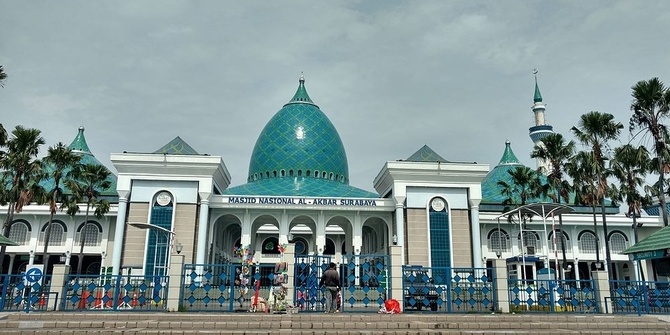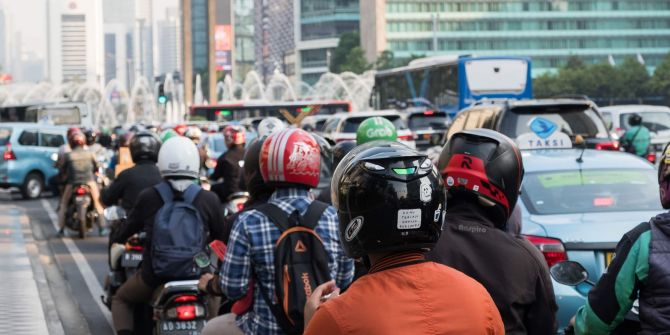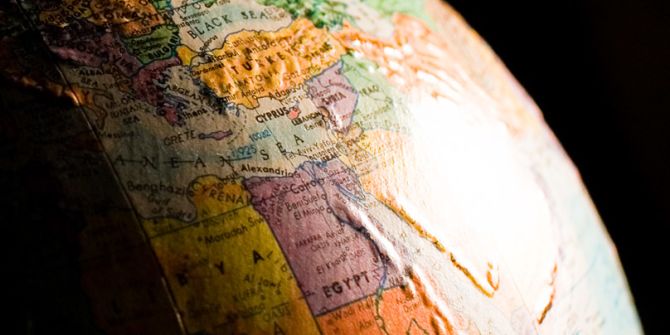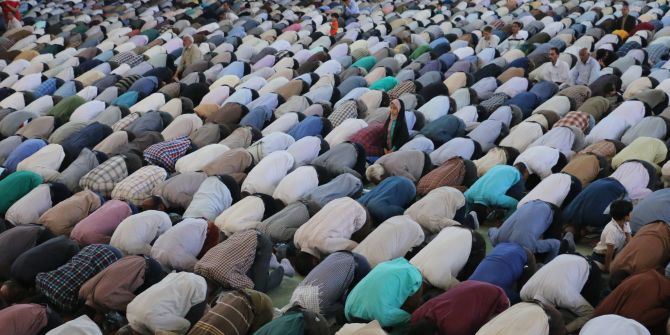In this article, Alexander Arifianto focuses on East Java to show how growing religious conservatism is influencing politics at the regional level in Indonesia. In return for the support of religious leaders, secular officials are increasingly introducing Islamist policies that suppress the freedoms of religious minorities, notably the Ahmadiyya Muslim minority.

Growing religious piety and conservatism is something many emerging middle power nations are currently experiencing. Indonesia – home to approximately 240 million Muslims, the largest Muslim-majority country in the world – is one of them. The increasing religiosity of Indonesian Muslims is not just demonstrated by growing expressions of religious piety among ordinary Indonesians, but also prompted by the increasing influence of religious power brokers – in this case Islamic clerics and activists – at both national and regional levels.
While many of the local regulations enacted have intentions directed at increasing religious piety – for instance, requiring school children to attend regular Qur’anic lessons – other regulations have been passed to suppress the practices of minority sects such as the Ahmadiyya Muslim minority, which is often persecuted by conservative Islamists both in Indonesia and in their homeland in Pakistan. One of these provinces is East Java. Home to nearly 40 million people, incidents of religious intolerance are not as widely reported here – in comparison to other Indonesian provinces like West Java and Aceh. In fact, East Java is widely perceived as a model province where a climate of interreligious tolerance has been successfully promoted. However, it is also a region where Islamic clerics (kyai) have gained significant prominence in regional and local politics, especially within the past decade. In the last gubernatorial election conducted in 2018, the two candidates – Khofifah Indar Parawansa and Saifullah Yusuf – courted the support of leading local kyais throughout the province. In doing so, they are more likely to accommodate the clerics’ demand to impose Islamic regulations, including those that might affect Ahmadi and Shiite minorities.
A sign of the growing influence of conservative clerics is the rapid increase in the number of local Islamic regulations (perda shari’a) enacted throughout Indonesia’s 567 regional governments. Political scientist Michael Buehler estimated that the number of these regulations has increased dramatically over the past decade – from approximately 150 regulations in 2009 to 770 in 2019. While many of these regulations were initiated by secular nationalist parties, the drivers of these regulations are often local religious power brokers – owners of influential Islamic boarding schools (pesantren) or leaders of the local branch of the Indonesian Ulama Council (MUI).
Increasingly, new regulations issued by local governments to restrict religious minorities in East Java are taking the form of voluntary circulars (surat himbauan) which, unlike perda, are not required to be reported to the Ministry of Home Affairs and, hence, are not facing scrutiny from the national government. Even though compliance for himbauan letters is ‘voluntary,’ local civil servants are enforcing it in a manner similar to more formal regulations such as perda, because these letters are signed by local government leaders like governors, Bupati (regents), and mayors. Senior bureaucrats do not want to jeopardize their future promotions by declining to enforce these ‘voluntary’ regulations.
An example of surat himbauan that has created some controversies in East Java over the past few years includes circular letters banning the celebration of Valentine’s Day on 14 February. The letters were issued in response to a religious edict (fatwa) issued by the East Java provincial branch of the MUI. In East Java province, the letters were issued in at least 10 localities, including in Surabaya and Malang – the two largest cities in the province. While the official rationale for these regulations is to prevent teenagers from having pre-marital sex, human rights advocates pointed out that Valentine’s Day is considered a Christian holiday, hence Islamic conservatives considered it an ‘unbelievers’ (kafir) celebration.
Other regencies and cities in East Java have also enacted religious regulations within the past decade. Even though the moderate Islamic group Nahdlatul Ulama (NU) predominates in East Java, its affiliated politicians often endorsed these regulations in order to secure their re-election prospects. For instance, Pasuruan regency has mandated all elementary school students to enroll in Qur’anic study lessons in local Islamic schools (madrasahs). This includes students from minorities background such as Christians and Hindus. A local NGO which assisted the Hindu Tengger minorities also reported that children belonging to the group are barred from attending local public schools. Their parents were told they would need to convert to Islam before the children could be enrolled.
In 2011, former East Java governor Soekarwo issued a decree which severely restricted the religious activities of the Ahmadiyya within East Java province. The decree was issued as a follow-up to a 2008 ministerial decree which forbids the Ahmadis from openly proselytizing their faith. Human rights advocates interviewed in Surabaya reported that the governor’s decree goes further than the joint ministerial decree, constituting a de facto prohibition against the Ahmadis from practicing their faith in East Java province.
The largest Ahmadiyya community in East Java is located in Surabaya, numbering approximately five to six thousand followers. Approximately one year after the governor’s decree took effect, the community experienced difficulties in renewing the land use permit (Hak Guna Bangunan) which the premises of their mosque in Surabaya depended upon. The local land agency informed them that their permit couldn’t be renewed because they were now a prohibited religious organization. In addition, the community also began to experience harassment from groups like the Islamic Defenders Front (Front Pembela Islam – FPI), which led the local police to guard the mosque in anticipation of potentially violent incidents.
For weeks there were standoffs between Ahmadi believers and the protesters. It was ended when senior leaders of the NU East Java provincial branch, together with the local police, helped to mediate the two parties. They finally agreed to let the Ahmadi mosque open and its land-use title was renewed. In exchange, the Ahmadis agreed to not proselytize their beliefs externally and to not let non-Ahmadis attend the Friday prayer service held at the mosque. Since reaching this understanding, the Ahmadi community in Surabaya has not been disrupted. However, the understanding between the Ahmadi community and the local authorities and religious leaders takes the form of an informal agreement between the parties. There is no formal agreement in the form of a government decree or circular that certifies the Ahmadis’ legal status, which means that this agreement can be reversed anytime whenever the political situation in East Java or the governor of the province changes.
To conclude, growing religious conservatism in Indonesia has empowered numerous clerics and activists who have become prominent power brokers in regional politics to institute religious by-laws. Unfortunately, such laws have oftentimes restricted the ability of religious minorities in Indonesia to freely worship and practice their faith. The enactment of local Islamic regulations and the persecution of Ahmadi minorities in East Java province indicates the growing influence of religious power brokers who are increasingly becoming politically influential as their endorsements are being sought after by politicians seeking election to public office.
While religious intolerance incidents in East Java might not be as acute as elsewhere in Indonesia, their numbers are not insignificant. Local government leaders and politicians – particularly those from an NU background – need to combat the intolerance trend within the province by taking actions to protect the rights of religious minorities – not just merely paying lip service to moderation and tolerance.
Note: This piece gives the views of the author(s), and not the position of the LSE Religion and Global Society blog, nor of the London School of Economics.




